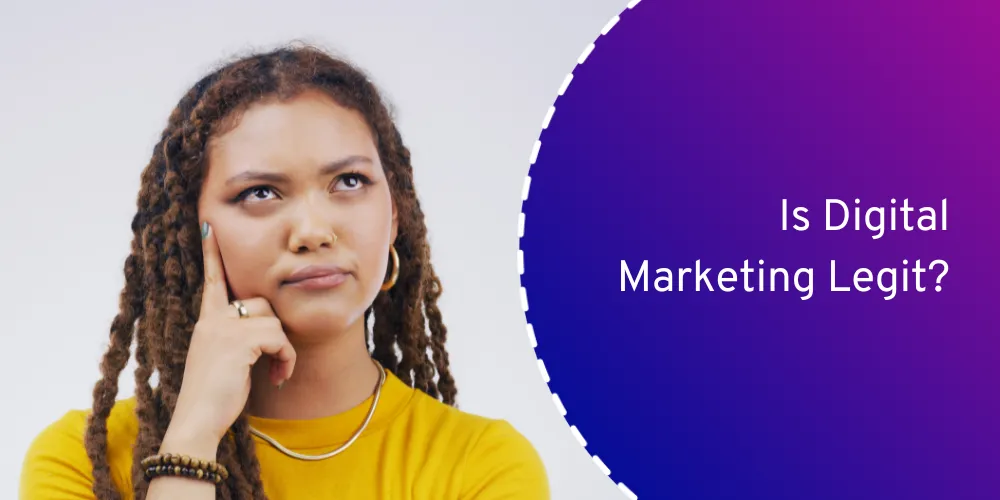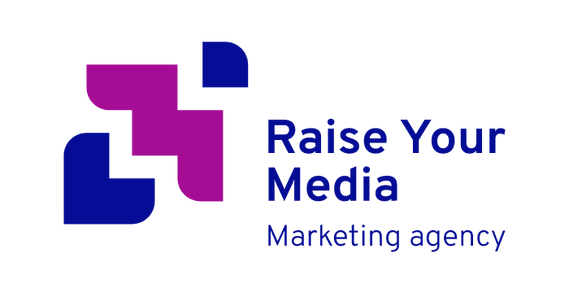Blog

Is Digital Marketing Legit?
Digital marketing is legitimate. It is a widely accepted form of marketing in today's world. It has become an undeniable part of marketing strategies for businesses of all sizes.
Success in digital marketing depends on strategy, execution, and ongoing campaign optimization. It's necessary to stay informed about the latest trends, tools, and best practices.
What is Digital Marketing?
Digital marketing involves various online actions and strategies to promote products, services, or brands using digital channels. It leverages the internet and electronic devices to reach and engage with a target audience. Promoting products or services using digital channels like websites, social media, email, and search engines is necessary.
Perks of Digital Marketing
Digital Marketing offers many advantages, including targeted audience reaches, measurable results, cost-effectiveness, and the ability to adjust real-time campaigns based on performance metrics. Successful businesses leverage digital marketing to connect with their target audience, build brand awareness, drive traffic, generate leads, and increase sales.
Core Digital Marketing Services
Search Engine Optimization (SEO):
SEO is the process of optimizing a website to rank higher in search engine results pages (SERP), making it more visible to users searching for relevant keywords.
Content Marketing:
Content marketing involves creating and distributing valuable, relevant, consistent content to attract and retain a target audience. Content can include blog posts, articles, videos, infographics, and more.
Social Media Marketing:
Utilizing social media platforms like Facebook, Instagram, Twitter, LinkedIn, and others to connect with the target audience, build brand awareness, and promote products or services.
Email Marketing:
Email marketing sends targeted messages and promotional content directly to a group of people via email. It is often used for customer engagement, lead nurturing, and direct marketing.
Pay-Per-Click (PPC) Advertising:
PPC advertising involves running online ads where a fee is paid each time the ad is clicked. This includes platforms like Google Ads and social media advertising.
Affiliate Marketing:
Partner with other businesses or individuals (affiliates) who promote a product or service and earn a commission for each sale or click generated through their referral.
Influencer Marketing:
Collaborate with influencers with a significant following on social media or online platforms to promote products or services.
Online Public Relations (PR):
Online PR involves managing and maintaining a positive online reputation through various digital channels, including social media, blogs, and online publications.
Analytics and Data Analysis:
The base function of data analysis is to utilize tools to collect and analyze user behavior, campaign performance, and other key metrics to make informed decisions and optimize marketing strategies.
Website Creation/Optimization
A website serves as the central online hub for businesses and individuals. It plays a crucial role in enhancing online visibility as a platform for creating and distributing valuable content. Through Search Engine Optimization (SEO), a website improves its chances of being discovered in online searches.
When is Digital Marketing a Scam?
As we have covered so far, digital marketing is a legitimate and widely accepted form of marketing that many businesses use successfully. However, certain practices within the realm of digital marketing can be considered scams or unethical. Here are some situations where digital marketing may be viewed as a scam:
False Promises:
It could be a scam if a digital marketing agency or individual makes unrealistic promises, like guaranteeing overnight success, massive traffic increases, or instant top search engine rankings. Legitimate digital marketing results often require time, effort, and ongoing optimization.
Fake Reviews and Testimonials:
Some unethical marketers may use fake reviews, testimonials, or case studies to create a false sense of credibility. If the authenticity of these endorsements needs to be clarified, you should be cautious.
Black Hat SEO Tactics:
Engaging in manipulative or prohibited SEO practices, known as black hat SEO, can lead to short-term gains but usually ends with long-term penalties from search engines. This includes practices like keyword stuffing, cloaking, or buying links.
Unsubstantiated Claims:
A digital marketing service claiming exclusive access to proprietary tools or secret strategies without providing any tangible evidence or transparency could be a scam.
Unethical Data Practices:
Misuse of customer data, such as unauthorized sharing or selling of personal information, is unethical and potentially illegal. Marketers must adhere to privacy regulations and respect user consent.
Overcharging for Services:
Charging outrageous fees without delivering commensurate value is unethical. It would help if you were wary of digital marketing providers who need to be more transparent about their pricing or provide vague justifications for high costs.
Hidden Fees:
Some scams involve hidden fees or additional charges that were not disclosed initially. Clear communication about costs and services is crucial for establishing trust.
Impersonation and Fraud:
Scammers may impersonate reputable digital marketing agencies or use deceptive tactics to gain access to sensitive information or funds. It's necessary to verify the legitimacy of service providers before entering into agreements.
In conclusion, digital marketing is undeniably legitimate and vital to modern marketing strategies. Its advantages include targeted audience reach, measurable results, and real-time campaign adjustments. It is indispensable for businesses of all sizes.
However, caution is necessary as certain practices within digital marketing can be considered scams or unethical. It would help if you prioritized transparency, ethical conduct, and realistic expectations when engaging in digital marketing endeavors. By staying informed about best practices and avoiding deceptive tactics, you can harness the power of digital marketing to connect with your audience and achieve your marketing objectives effectively.
Copyright © 2017-2025 Raise Your Media I Privacy Policy
We believe that every small business deserves simple and effective sales and marketing tools.


